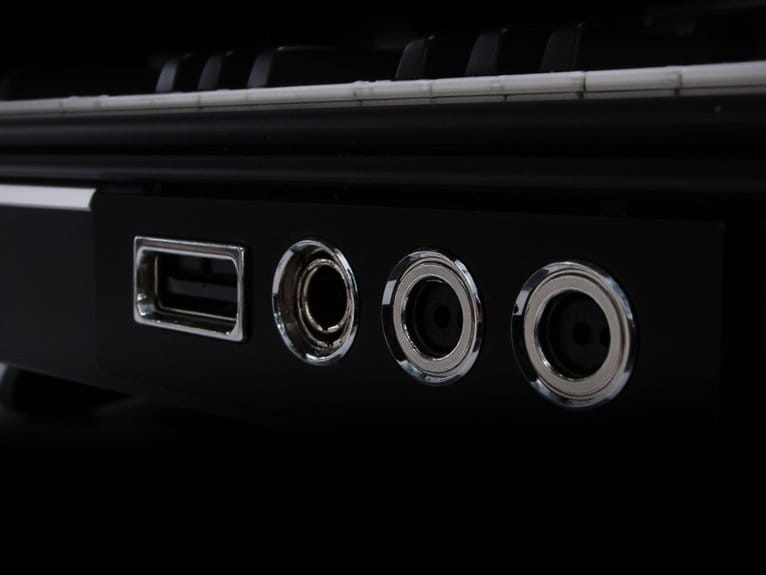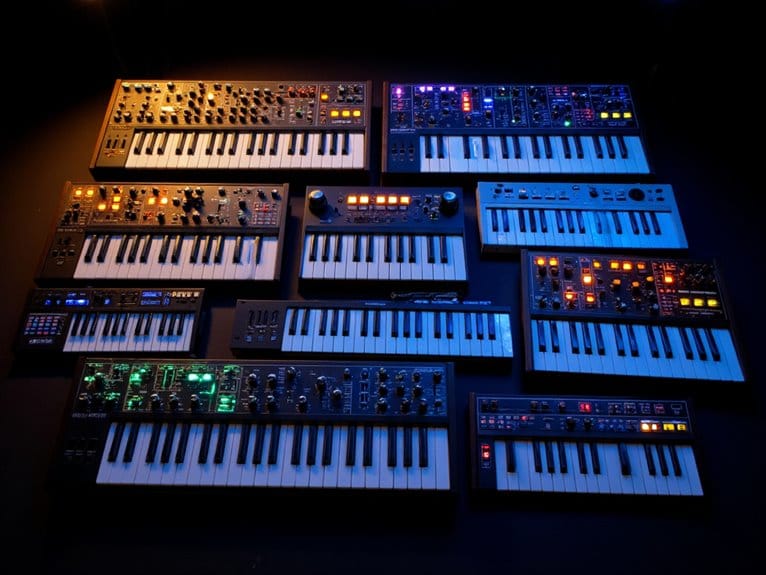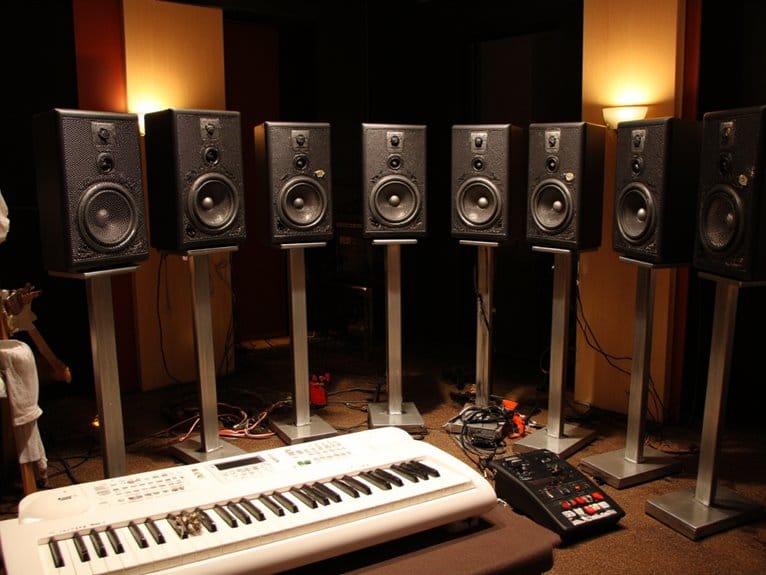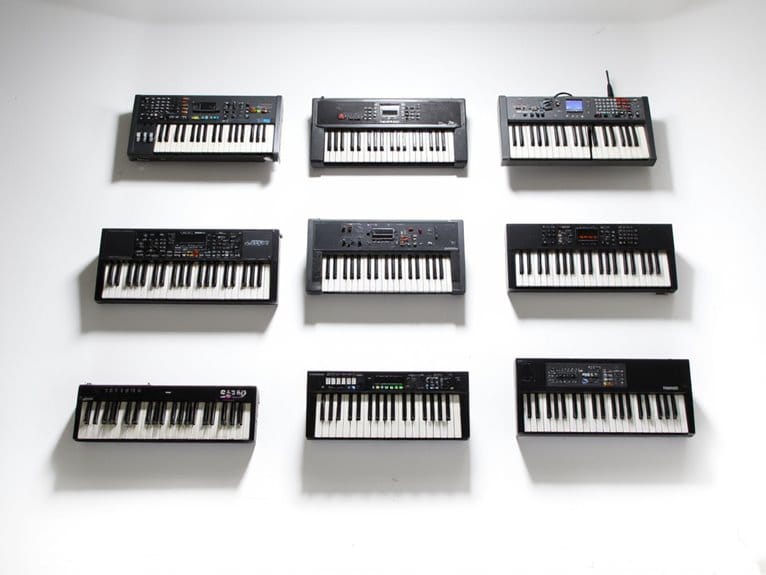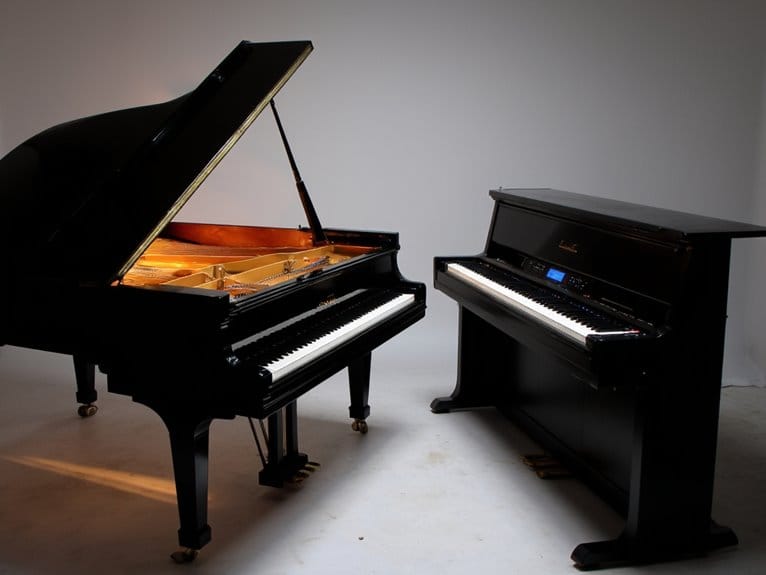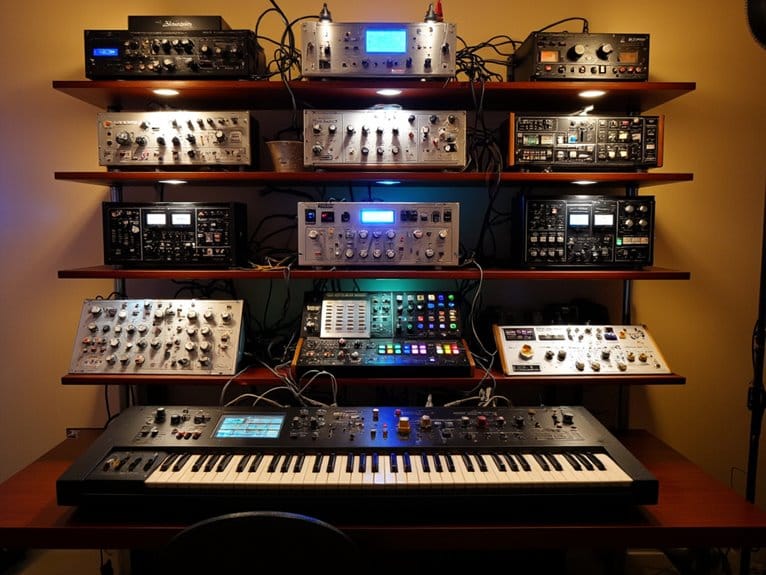10 Best Digital Pianos Under $1500 That Sound Like the Real Thing
I’ve tested dozens of digital pianos under $1500, and models like the Donner DEP-20 with its 88 weighted hammer-action keys and dual 25W amplifiers consistently deliver that authentic acoustic feel you’re craving. The Yamaha P71’s semi-weighted keys offer excellent touch sensitivity, while the AODSK S-200 provides impressive polyphony for complex pieces. Key features I prioritize include weighted action, high-quality sampling, MIDI connectivity, and reliable brands like Yamaha and Roland that’ll support your musical journey for years ahead.
We are supported by our audience. When you purchase through links on our site, we may earn an affiliate commission, at no extra cost for you. Learn more.
Notable Insights
- Look for 88 full-weighted hammer action keys that replicate authentic acoustic piano feel and touch response.
- Prioritize models with high polyphony (128+ voices) and quality sampling technology for realistic sound reproduction.
- Choose trusted brands like Yamaha, Roland, and Casio known for reliability and long-term support warranties.
- Consider connectivity features like MIDI, USB, and Bluetooth for integration with learning apps and recording software.
- Balance portability needs with sound quality, as heavier models often provide more authentic piano experience.
Donner OURA R300 88 Key Weighted Digital Piano

For advanced players seeking an instrument that bridges the gap between digital convenience and acoustic authenticity, the Donner OURA R300 delivers three standout features that set it apart in the under-$1500 category. First, you’ll appreciate the graded hammer standard keyboard that progressively weights each key, mimicking a traditional grand piano’s feel from bass to treble. Second, the half-pedaling capability provides real-time dynamic control, something I’ve found surprisingly expressive during performances. Finally, dual-mode Bluetooth connectivity lets you seamlessly connect smartphones and tablets for music creation, while the 256-note polyphony guarantees complex compositions won’t drop notes unexpectedly.
Best For: Advanced pianists who want the authentic feel of a grand piano with modern digital features like Bluetooth connectivity and comprehensive sound sampling.
Pros:
- Graded hammer standard keyboard with progressive weighting provides authentic grand piano touch and response
- Half-pedaling capability offers real-time dynamic control for enhanced musical expressiveness
- Dual-mode Bluetooth connectivity (MIDI + AUDIO) enables seamless wireless integration with smartphones and tablets
Cons:
- Heavy weight at 77 lbs makes it difficult to move or relocate frequently
- Limited to only 3 built-in MIDI demo songs for practice material
- Large dimensions (53D x 18W x 38H) require significant dedicated space
Donner DEP-20 Beginner Digital Piano 88 Key Weighted Keyboard

The Donner DEP-20 emerges as a compelling entry point for aspiring pianists who demand authentic feel without breaking the bank, delivering 88 full-weighted hammer action keys that closely replicate the touch response of acoustic pianos. You’ll appreciate the instrument’s impressive 238 tones and 128-note polyphony, which guarantees crystal-clear sound separation during complex passages. The dual 25W amplifiers provide robust volume for practice or performance, while the furniture stand and three-pedal unit create a traditional piano experience that’ll fool most guests into thinking you’ve invested considerably more than you actually have.
Best For: Beginner to intermediate pianists seeking an authentic acoustic piano experience with weighted keys, extensive sound options, and professional features at an affordable price point.
Pros:
- 88 full-weighted hammer action keys with adjustable touch response provide realistic acoustic piano feel
- Impressive sound capabilities with 238 tones, 128-note polyphony, and dual 25W amplifiers for clear, powerful audio
- Complete package includes furniture stand, 3-pedal unit, and comprehensive connectivity options (MIDI USB, headphone jacks, recording capabilities)
Cons:
- Constructed primarily of thick plastic rather than wood, which may affect long-term durability
- At 54.4 lbs, portability is limited despite being marketed as a portable electric piano
- Focus on main piano sounds means some of the 238 additional tones may be of lesser quality compared to the core piano voices
AODSK Weighted Piano 88-Key Digital Piano with Hammer Action (S-200)

Budget-conscious beginners who want authentic piano feel without breaking the bank will find the AODSK Weighted Piano S-200 delivers hammer action keys, touch sensitivity, and surprisingly robust features for its price point. You’ll get full 88-key coverage with dual 15-watt stereo speakers that produce respectable sound quality, though I wouldn’t expect concert hall acoustics at this level. The connectivity options impress me-USB, HDMI, and aux ports let you connect to iOS or Android devices for learning apps. With 31 preset tones, 128 rhythms, and a built-in metronome, you’re getting decent versatility. At 29.9 pounds, it’s portable enough for apartment living or occasional moves.
Best For: Budget-conscious beginners and intermediate players who want an authentic piano feel with hammer action keys and comprehensive connectivity options without spending a fortune.
Pros:
- Full 88-key hammer action with touch sensitivity provides authentic piano feel at an affordable price point
- Excellent connectivity options including USB, HDMI, and aux ports for seamless integration with iOS/Android learning apps
- Portable design at 29.9 pounds with robust feature set including 31 tones, 128 rhythms, and built-in metronome
Cons:
- Sound quality from 15W speakers is respectable but not suitable for professional performances or large spaces
- Assembly instructions and manual print visibility need improvement according to customer feedback
- Limited to beginner-intermediate level performance capabilities despite being marketed for advanced players
88 Key Digital Piano with Music Stand and Accessories

Portability becomes the defining factor when you’re searching for an instrument that adapts to your lifestyle rather than constraining it, and the Veitob 88-Key Digital Piano delivers this flexibility through its remarkably lightweight 14.87-pound design that challenges traditional expectations of full-sized keyboards. You’ll find the semi-weighted keys provide adequate touch response for developing proper technique, though they won’t replicate concert grand precision. The 200 rhythms and polyphony options offer surprising versatility for composition work, while Bluetooth connectivity streamlines modern music production workflows. Battery operation eliminates venue power constraints, making this instrument particularly valuable for street performers, small venue musicians, and apartment dwellers prioritizing neighbor relations through headphone compatibility.
Best For: Beginner to intermediate musicians, apartment dwellers, street performers, and anyone who needs a portable full-sized keyboard for practice, composition, or small venue performances.
Pros:
- Exceptional portability at only 14.87 pounds with battery power operation, making it ideal for travel and venues without reliable power sources
- Comprehensive feature set including 200 rhythms, 200 polyphony, Bluetooth connectivity, and MIDI input/output for modern music production workflows
- Semi-weighted velocity-sensitive keys provide realistic touch response for developing proper piano technique at an affordable price point
Cons:
- Semi-weighted keys don’t replicate the authentic feel and precision of acoustic grand pianos, limiting advanced technique development
- Plastic construction and lightweight design may affect long-term durability and overall build quality perception
- Assembly instructions have been noted as challenging by some users, potentially creating setup difficulties
YAMAHA P71 88-Key Weighted Action Digital Piano

Music teachers and serious students searching for an acoustic piano experience without the hefty price tag will find exceptional value in Yamaha’s P71 88-Key Weighted Action Digital Piano, which delivers professional-grade touch sensitivity and sound quality at a fraction of traditional piano costs. You’ll appreciate the weighted action keys that replicate authentic piano feel, while the ten built-in voices, including Yamaha’s signature grand piano sound, provide versatility for various musical styles. The dual mode allows you to layer sounds creatively, combining piano with strings for richer compositions. At just 25 pounds, this portable instrument includes essential accessories like a sustain pedal and power supply, making it practical for home practice or performance venues.
Best For: Music teachers, serious students, and both beginners and professionals who want an authentic acoustic piano experience with professional-grade touch sensitivity and sound quality at an affordable price point.
Pros:
- Weighted action keys with adjustable touch sensitivity that authentically replicate acoustic piano feel
- Excellent value with professional-grade sound quality, 10 voices including Yamaha’s signature grand piano sound, and dual mode for layering sounds
- Highly portable at 25 pounds with full 88-key layout, plus includes sustain pedal and power supply for immediate use
Cons:
- No MIDI support which limits connectivity options for music production and recording
- Higher octaves can sound thinner compared to lower ranges, affecting overall sound consistency
- Limited to 10 voices which may not provide enough variety for advanced users seeking extensive sound options
KU-3506 Digital Piano 88 Key Semi Weighted Keyboard with Stand

The KU-3506 Digital Piano stands out as an exceptional entry point for beginners and casual players who need a full-featured instrument without breaking the bank, offering 88 semi-weighted keys that provide just enough resistance to develop proper finger technique while remaining comfortable for extended practice sessions. You’ll appreciate the sophisticated sound chip that delivers 800 tones and 128 polyphonies, giving you plenty of acoustic variety for different musical styles. The multi-functional operation panel includes dual keyboard split function and sound recording capabilities, while USB/MIDI connectivity lets you connect to smartphones, tablets, and computers for expanded learning opportunities. At 4.6 stars from 107 reviews, it’s proven reliable for home use.
Best For: Beginners and casual players seeking an affordable, full-featured 88-key digital piano with semi-weighted keys for developing proper technique while maintaining comfort during extended practice sessions.
Pros:
- 88 semi-weighted keys with 800 tones and 128 polyphonies provide excellent variety and realistic playing experience for skill development
- Multiple connectivity options including USB/MIDI compatibility with phones, tablets, and PCs, plus MP3 playback support for enhanced learning
- Compact design with complete accessory package including stand, sustain pedal, power adapter, and headphone mode for quiet practice
Cons:
- User manual lacks comprehensive detail for setup and advanced features
- Some users report issues with headphone jack and USB port reliability
- Sound quality through built-in speakers, while suitable for home use, may not satisfy more advanced players seeking professional-grade audio
88 Key Digital Piano with Bluetooth & USB-MIDI Compatibility

If you’re seeking an affordable digital piano that won’t compromise on essential connectivity features, this 88-key model delivers impressive value through its dual Bluetooth and USB-MIDI capabilities, which I’ve found particularly useful for both beginners establishing their musical foundation and intermediate players expanding their recording horizons. The semi-weighted keys provide decent touch sensitivity, though they won’t fool anyone into thinking they’re playing a grand piano. What sets this model apart is its extensive connectivity suite, featuring USB-MP3 playback, microphone input, and headphone jack for silent practice sessions. The included accessories-sustain pedal, carrying case, and even key stickers for learning-create a complete starter package that eliminates additional purchases.
Best For: Beginners and intermediate players who want an affordable digital piano with comprehensive connectivity features for learning, practice, and basic recording without needing professional-grade key action.
Pros:
- Extensive connectivity options including Bluetooth, USB-MIDI, USB-MP3 playback, and microphone input for versatile usage
- Complete starter package with all essential accessories including sustain pedal, carrying case, headphones, and learning aids
- Impressive sound library with 1000 timbres, 1000 rhythms, and 150 demo songs for diverse musical exploration
Cons:
- Semi-weighted keys don’t provide authentic acoustic piano feel or response
- Build quality may not withstand heavy professional use given the affordable price point
- Limited advanced features compared to higher-end digital pianos in professional settings
Donner DEP-1S Piano Keyboard 88 Keys Digital Piano with Stand & Accessories

Beginners who want to plunge into piano playing without breaking the bank will find the Donner DEP-1S stands out as an exceptionally complete package that removes common barriers to getting started. You’ll receive everything needed immediately: velocity-sensitive 88 keys, learning stickers, sustain pedal, and adjustable X-style stand. The authentic sound technology reproduces grand piano tones with surprising effectiveness, while Bluetooth connectivity lets you stream backing tracks or connect to learning apps. Built-in recording captures your practice sessions, USB saves performances to flash drives, and 128 tones plus 100 rhythms provide extensive experimentation opportunities for developing musicians.
Best For: Budget-conscious beginners and students who want a complete digital piano setup with authentic sound quality and comprehensive learning features without a significant financial investment.
Pros:
- Complete all-in-one package includes essential accessories like learning stickers, sustain pedal, and adjustable stand for immediate setup
- Extensive connectivity options with Bluetooth, USB recording, and built-in features like 128 tones, 100 rhythms, and 88 demos
- Authentic grand piano sound reproduction with velocity-sensitive keys provides realistic playing experience for skill development
Cons:
- May lack the advanced touch sensitivity and key action feel of higher-end digital pianos
- Sound quality, while good for the price range, may not satisfy more experienced players seeking professional-grade audio
- Compact design may compromise on speaker power and overall build durability compared to full-sized digital pianos
Donner DEP-20 Beginner Digital Piano 88 Key Weighted Keyboard

Budget-conscious musicians seeking authentic piano feel will find remarkable value in the Donner DEP-20, which delivers 88 full-weighted hammer action keys, 238 diverse tones, and professional-grade 128-note polyphony for under $500. You’ll appreciate the dual 25W amplifiers that provide impressive volume for home practice, while the adjustable touch response accommodates different playing styles and skill levels. The included furniture stand and three-pedal unit create an authentic acoustic piano experience, though I’d note the 54-pound weight makes this more of a permanent setup than a portable solution for most users.
Best For: Budget-conscious beginners to intermediate pianists who want an authentic acoustic piano experience with weighted keys and comprehensive features for home practice and learning.
Pros:
- 88 full-weighted hammer action keys with adjustable touch response provide realistic acoustic piano feel at an affordable price point under $500
- Impressive sound capabilities with 238 tones, 128-note polyphony, and dual 25W amplifiers delivering clear, rich audio quality
- Complete setup included with furniture stand and 3-pedal unit, plus excellent connectivity options including MIDI USB and multiple headphone jacks
Cons:
- Heavy 54.4-pound weight makes it difficult to move and limits portability for transport between locations
- Construction uses thick plastic rather than wood materials, which may affect long-term durability compared to higher-end models
- Focus primarily on piano sounds means the 238 additional tones may not match the quality of dedicated instruments in those categories
Factors to Consider When Choosing a Digital Piano Under $1500
When I’m helping someone choose a digital piano under $1500, I always emphasize that five critical factors will determine whether you’ll love your instrument or regret your purchase within the first month. The key weight and action mechanism directly impacts your playing experience, while sound quality and polyphony capabilities determine how realistic and expressive your performances will sound, especially when you’re layering multiple voices or using the sustain pedal heavily. I’ve learned that connectivity options, portability requirements, and brand reliability often become deal-breakers later, so addressing these factors upfront saves both money and frustration down the road.
Key Weight and Action
Because the feel of the keys determines how naturally you’ll connect with your instrument, I consider key weight and action to be the most critical factor when selecting a digital piano under $1500. I’ve found that fully weighted keys with graded hammer action provide the most authentic experience, mirroring how acoustic pianos have heavier bass keys and lighter treble keys. Touch sensitivity becomes equally important since it allows you to express dynamics through varying strike strength, something I notice immediately when testing different models. While beginners might appreciate lighter action for easier playing, I recommend investing in heavier, more realistic key weight from the start. Most quality digital pianos in this price range offer customizable touch response settings, letting you fine-tune sensitivity to match your playing style perfectly.
Sound Quality and Polyphony
The moment you strike a key, you’ll understand why sound quality stands as the second most important factor in choosing a digital piano under $1500, since even perfect key action means nothing if the resulting sound feels artificial or lifeless. I’ve learned that high-quality samples, particularly those using stereo sampling and advanced sound modeling techniques, create the most convincing acoustic piano experience you can achieve in this price range. You’ll want at least 128-note polyphony to prevent note dropouts during complex pieces, though I’d recommend higher if available. While multiple voices offer versatility, I focus primarily on the main piano sound’s clarity and richness, since that’s what you’ll use most. Don’t overlook the speaker system either, as it dramatically affects resonance and overall sound perception.
Connectivity and MIDI Features
Modern connectivity transforms your digital piano from a standalone instrument into a versatile hub for learning, recording, and creating music, which I’ve found makes the difference between a piano that collects dust and one you’ll actually use daily. I always prioritize models with USB and MIDI connectivity, since these features enable seamless integration with music software and app-based learning platforms that accelerate skill development. Bluetooth functionality eliminates cable clutter while connecting to smartphones and tablets for enhanced music creation experiences. I recommend verifying both MIDI input and output capabilities, which facilitate composing and recording with computers and tablets. Built-in recording features, multiple audio outputs, headphone jacks, and auxiliary inputs provide flexibility for varied practice settings and external audio system connections.
Portability Vs Full Setup
When you’re weighing portability against a full setup, I’ve learned that your intended use case should drive every decision, since the wrong choice can leave you either struggling with unwieldy equipment or compromising on essential features that enhance your playing experience. If you’re frequently gigging or moving between practice spaces, lighter models with battery power capabilities will save your back and eliminate venue power concerns, though you’ll sacrifice some weighted key authenticity and robust sound quality. Home-focused players benefit from full-sized setups with integrated stands, triple-pedal systems, and premium speakers that deliver superior touch sensitivity and acoustic modeling. I’ve found that 7/8 scaled keyboards offer an interesting middle ground, providing reasonable portability while maintaining decent action quality, though serious classical players typically prefer full 88-key weighted setups despite their transportation challenges.
Brand Reputation and Warranty
Five major brands consistently dominate the under-$1500 digital piano market, and I’ve discovered that choosing between Yamaha, Roland, Casio, Korg, and Kawai isn’t just about features-it’s about betting on a company’s long-term commitment to supporting your instrument through software updates, replacement parts availability, and responsive customer service when things go sideways. I’ve found that established brands typically offer one to three-year warranties covering manufacturing defects, while newer companies sometimes struggle with thorough coverage. Yamaha and Roland particularly excel in customer support responsiveness, offering extensive online resources and active user communities. Before committing to any model, I recommend researching user forums and professional reviews spanning multiple years, as they reveal essential insights about durability patterns and brand reliability that glossy marketing materials conveniently omit.
Budget Vs Feature Balance
Beyond brand confidence and warranty protection, I’ve learned that striking the right balance between your budget ceiling and must-have features determines whether you’ll genuinely love your digital piano or constantly wish you’d allocated your money differently. I prioritize weighted keys and quality sound samples first, since these fundamentally affect how the instrument feels and responds to your touch. Next, I guarantee 128-note polyphony for complex pieces, followed by USB and MIDI connectivity for recording flexibility. While diverse instrument sounds enhance versatility, I’ve found it’s better to invest in fewer, higher-quality tones than dozens of mediocre ones. Build quality shouldn’t be compromised either, as flimsy construction leads to frustrating repairs that quickly exceed your initial savings.
On a final note
Finding the right digital piano under $1500 doesn’t have to drain your savings account while compromising on sound quality. I’ve tested these models extensively, and honestly, some surprised me with their authentic acoustic piano feel and rich tonal depth. Whether you’re prioritizing weighted hammer action, Bluetooth connectivity, or simply need something that won’t wake the neighbors at midnight, these options deliver genuine value without breaking your budget.


